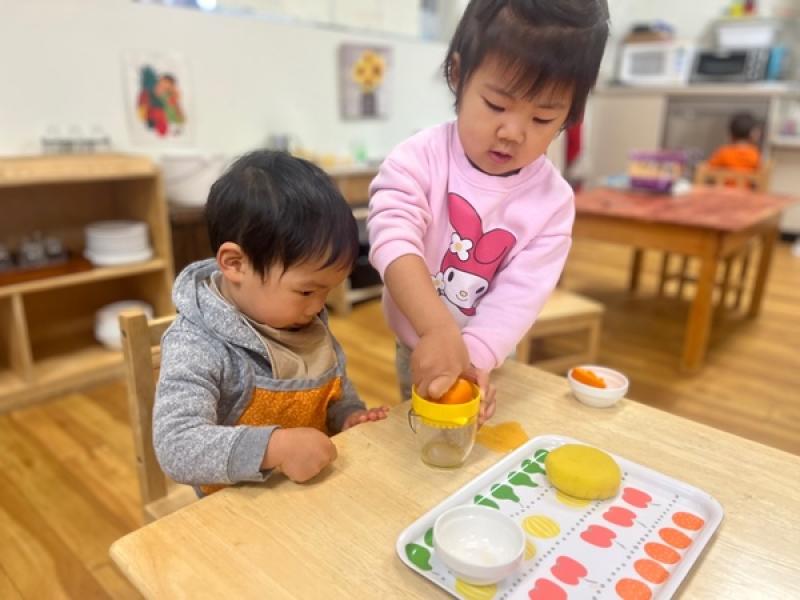Maria Montessori fosters the idea that real purposeful work prepares one for real life. You may witness your child helping at home with mundane tasks, such as wiping up, pushing a chair in, pouring water, and cleaning and washing their hands. The traditional work of the family is referred to in Montessori as practical life work. It is the most critical area of education for life. While these activities vary within various cultures, they are all forms of purposeful work children thrive at mastering. There are three groups we focus on here for your child.
- Care of the environment—cleaning, sweeping, polishing, hanging up clothing, washing clothes, gardening, and putting away toys.
- Care of the person—bathing, dressing, brushing teeth, cooking, setting the table.
- Grace and courtesy—walking carefully, carrying things, opening and closing a door, tucking in a chair when finishing work, rolling up a floor mat, offering food, saying "please" and "thank you."
These seemingly mundane activities, such as dressing, dusting, sweeping, preparing and serving food, and fixing or building work that the child sees going on all day, they learn to use their body and mind for a purpose. Concentrating, completing cycles of activity, finishing what they have started, and most importantly, contributing to the vital work of the family and their social group.
Practical life activities provide the superior groundwork for physical, mental, and social development and teach the work habits that lead to success in all later academic work.
Practical life work provides practice in eye-hand coordination, controlling large and small muscles, walking and carrying objects with control, and behaving with knowledge of good manners. These activities bring the child's attention to his progress and development and open up a world of meaningful work. For example, learning to look a person in the eye when speaking, to listen patiently, and to exhibit thoughtfulness through good manners, enables the child to be welcomed into a social group, to be happy, and to make others happy.
Children have, for eons, shown an interest in daily life through make-believe cooking and cleaning. It was one of the pivotal discoveries of Dr. Montessori that, given a chance, children usually choose real work over imaginary. Allowing the child to participate in the daily work they see going on around them is an act of great respect for and confidence in the child. It helps the child feel important to themselves and those around them. Children want us to help them to do it themselves.
The child's reason for, and way of, working is different from ours. Adults will usually choose to do things the most efficiently and quickly and rush through or avoid anything labeled work. On the other hand, a child is working on mastering the activity and practicing and perfecting their abilities. For example, a child may scrub a table each day for weeks, then turn their attention to another activity to master. We must not consider this method as inconsistency or laziness but as cumulative mastery of abilities. The child's purpose is not to complete the task but to construct the self.
Practical life activities may be the most critical work in the Montessori 3-6 Primary class. Through these activities, the child learns to make intelligent choices and become physically and mentally independent and responsible. In addition, children learn to concentrate, control muscles, act carefully, focus, analyze logical steps, and complete an activity cycle.
This lays the groundwork for good mental and physical work throughout life.
-Dragonfly Teacher


